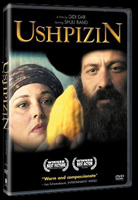 BUY IT AT AMAZON: CLICK HERE!
BUY IT AT AMAZON: CLICK HERE!
STUDIO: New Line
MSRP: $27.98
RATED: PG
RUNNING TIME: 92 Minutes
SPECIAL FEATURES:
• DVD-ROM links
• Trailers
The Pitch
"Guess
Who’s Coming To Dinner In Jerusalem!"
The Humans
Shuli
Rand, Michal Bat-Sheva
The Nutshell
Harmless
Moshe Ballanga (
Rand) have a small apartment, no income, no children, and that sort of
unshakeable faith that seems to envelop the nearly-destitute. Then, on the eve
of the festival of Succah, a miracle visits the Moshe in the form of an
envelope full of hundred-dollar bills.
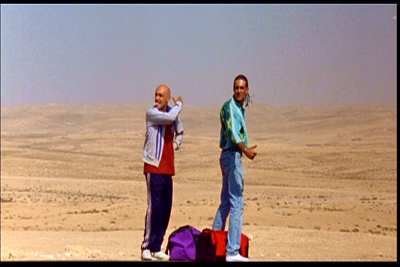
Moses’ last surviving relatives try to get their desert-wandering done in record time.
Nothing
comes without a tradeoff, however, even in miracles. Two escaped convicts, one
of whom seems to know a great deal more about Moshe than he ought to, come
crashing into the Ballanga’s lives, shattering their peace and their prosperity
and taking advantage of their gentle spirits. In a life that seems to be
nothing more than a string of tests given by the Lord, how will Moshe handle
the challenge of maintaining his warmth and hospitality toward these selfish,
sinning curs?
The Lowdown
Religious
movies and zombie movies have an awful lot in common. Both genres are
ostensibly about unthinkable circumstances, but actually about the humans
facing those circumstances. Horror is the primary emotion in both, whether it
manifest in fear of death or the more ambiguous suspicion that God is a
distant, uncaring being.
Ushpizin claims to be about a couple of
different things: miracles and unwanted guests, but really it’s about Moshe and
Malli. Their faiths are tested by miracles; their resolve called to the floor
when the uncouth guests arrive.
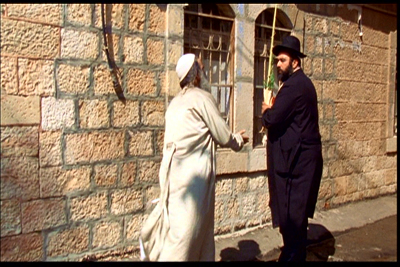
"Get your own organic fishing pole!"
The
concept of the miraculous is well-portrayed here, with nothing didactic to
distance the audience from the human drama. The catalyst miracle is achieved
through human means, though its origin is hidden to Moshe. What follows is a
lively and honest look at what people will do when they believe they have
encountered a god.
The
characters of Moshe and Malli are the undeniable soul of the film, and it
functions best when they are interacting, be it united in joy or split by
conflict. Both actors deliver grounded performances in the midst of small
technical challenges, such as finding a new way to portray celebration, or
giving a new take on tension around the dinner table. There is a uniqueness to
their performances, especially for American audiences, because they are such
unassuming characters.
Director
Gidi Dar is less successful when squeezing his characters through the sharp
corners of a plot. Act breaks are too abrupt, and plot progression relies too
much on familiar techniques, such as the overheard conversation, or the
marriage-threatening argument. The result is a film that behaves much like a
sine curve, rising and dipping across a line of mediocrity.
Also
found on the positive side of the curve are the comedic elements. This is not a
strict comedy, but the conventions of the genre occasionally apply, especially
with dealing with the house guests. The sections serve to balance the religious
tone, as much of the humor is secular in nature, which ensures the struggles of
the characters are less isolated. Everything occurs in the world, not in an
ivory tower, though the Jewish god is ever-present in dialogue.
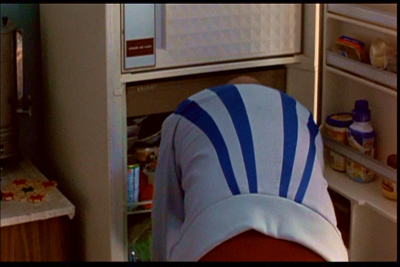
With no oven at hand, little Lechem had to make do.
The overall
effect of the story seems to veer between a couple of options for the first two
acts. It says some things on miracles and how the humans who receive them can
pervert the good intentions of the Lord; it also carries some compelling,
though uncomplicated, studies of tolerance. Unfortunately, the conclusion fails
to bring these themes together in any satisfying way, and pulls out a needlessly
saccharine last reel. I say "needlessly" because there is a sweetness
that pervades the movie already, a humanity that engenders sympathy and a sort
of affection. The seen-it-before end leaves the audience stuck on forced plot,
when they should be thinking about the wonderful characters.
The Package
There are
no real bonuses of note. You get a couple of theatrical trailers and some
DVD-ROM content, which is comprised of some links to websites related to the
film. There is also an informational screen, accessible from the main menu,
that instructs the viewer on how to purchase a license to present Ushpizin
in public.
The audio
is in 2.0 stereo, in the original Hebrew with English subtitles. The way music
was incorporated into the film doesn’t work, since it’s plainly overdubbed —
there wasn’t much effort to give it a quality of meshing with the space on
screen. The video is in 1.85:1 widescreen, and suffers from no problems. The
color palette is full of that grays and brows of dust and clay, but the
temperature is kept in check enough to prevent the atmosphere from being
oppressive.
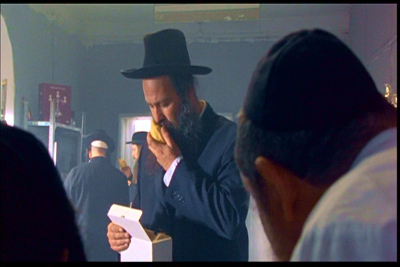
Christians have their tools of execution, Hindus have their improbably-proportioned gods,
and Jews get stuck with inedible fruit.
I gotta
mention the cover, just because it’s such a perfect symbol for those who have
seen the film, but such a bizarre image for those who haven’t. Moshe and Malli
are observing at "the perfect citron," a fruit that figures
prominently in the Jewish rituals the film is concerned with. So, no, they’re
not high and staring at a lemon; nor are they trying to perfect their laser
eyes, but I wouldn’t blame you for thinking so.
7.4 out of 10